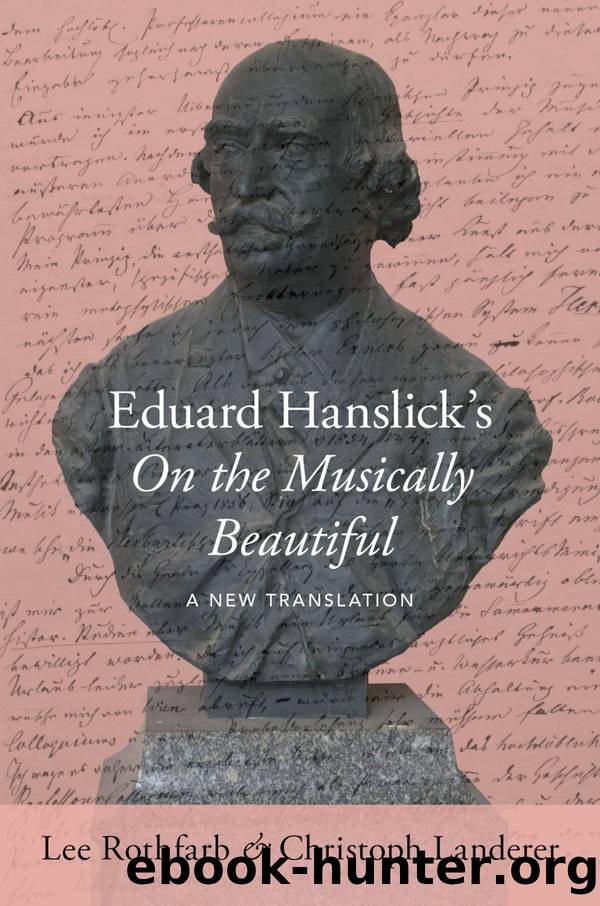Eduard Hanslick's on the Musically Beautiful by Rothfarb Lee; Landerer Christoph;

Author:Rothfarb, Lee; Landerer, Christoph;
Language: eng
Format: epub
Publisher: Oxford University Press, Incorporated
Published: 2018-02-15T00:00:00+00:00
Are we to believe that de la Harpe himself failed to recognize how splendidly he stood on firm ground? For soon after, it almost occurs to him to dispute the duet between Agamemnon and Achilles in Iphegenia âbecause it is definitely not congruous with the dignity of these two heroes to speak simultaneously.â He thereby forsook and betrayed that solid ground, the principle of musical beauty, tacitly, unwittingly acknowledging the principle of the opponent.
The more systematically we want to keep the dramatic principle pure in opera, withdrawing from it the life-breath of musical beauty, the more feebly it fades away, like a bird beneath [67] a vacuum jar.18 We must necessarily come back to the purely spoken drama, whereby we at least have proof that opera is actually impossible if we do not accord sovereignty in opera to the musical principle (in full awareness of its reality-averse nature). In actual artistic practice, that truth has also never been denied. To be sure, even the most rigorous dramatist, Gluck, postulates the erroneous theory that operatic music is to be nothing more than heightened declamation, but in practice the musical nature of the man breaks through often enough, and always to great benefit of his work. The same holds for Richard Wagner. For our context, it need only be stressed decisively that Wagnerâs main tenet, as he articulates it in the first volume of Opera and DramaââThe error of opera as a genre of art consists in the means (the music) being made the end, the end (the drama), however, the meansââis a false premise. For an opera in which music is always and actually used only as a means for dramatic [68] expression is a musical absurdity.19
[69] One consequence of Wagnerâs tenet (about means and end) would be, among others, also that all composers have done a great injustice if [70] they sought to write more than mediocre music to mediocre text and plots, and that we would likewise commit a grave injustice in liking such music.
The connection of poetry with music and opera is a left-handed marriage. The closer we ponder that morganatic marriage, which musical beauty enters into with the content specifically prescribed for it, the more deceptive does their insolubility seem to us.20
How is it that we can undertake one or another small modification in any vocal piece [71] that, without weakening in the least the accuracy of the expression of feeling, nevertheless immediately destroys the beauty of the theme? That would be impossible if the beauty of the theme lay in the accuracy of the expression. How is it that some vocal pieces that flawlessly express their text seem to us intolerably bad? From the standpoint of the feeling principle, there is no getting around this. What remains, then, as the principle of beauty in music after we have rejected feelings as insufficient for the task?
A completely other autonomous element that we will now consider more closely.
Download
This site does not store any files on its server. We only index and link to content provided by other sites. Please contact the content providers to delete copyright contents if any and email us, we'll remove relevant links or contents immediately.
The Goal (Off-Campus #4) by Elle Kennedy(12429)
Kathy Andrews Collection by Kathy Andrews(10517)
Diary of a Player by Brad Paisley(6866)
What Does This Button Do? by Bruce Dickinson(5525)
Assassin’s Fate by Robin Hobb(5236)
Big Little Lies by Liane Moriarty(4879)
Pale Blue Dot by Carl Sagan(4001)
Sticky Fingers by Joe Hagan(3454)
The Heroin Diaries by Nikki Sixx(2930)
The Death of the Heart by Elizabeth Bowen(2901)
Beneath These Shadows by Meghan March(2718)
The Help by Kathryn Stockett(2702)
Confessions of a Video Vixen by Karrine Steffans(2672)
How Music Works by David Byrne(2524)
Jam by Jam (epub)(2486)
Harry Potter 4 - Harry Potter and The Goblet of Fire by J.K.Rowling(2416)
Strange Fascination: David Bowie: The Definitive Story by David Buckley(2367)
Petty: The Biography by Warren Zanes(2237)
Darker Than the Deepest Sea by Trevor Dann(2206)
